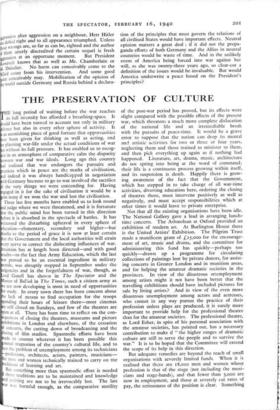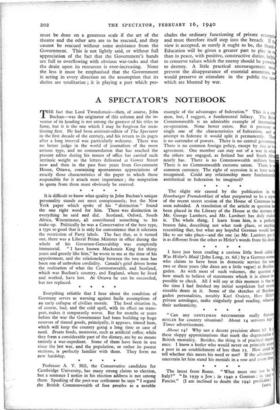THE PRESERVATION OF CULTURE
HE long period of waiting before the war reaches its full intensity has afforded a breathing-space. It ould have been turned to account not only in military efence but also in every other sphere of activity. It an astonishing piece of good fortune that opportunities ye been given for thinking as well as acting, and r planning war-life under the actual conditions of war ut without its full pressure. It has enabled us to recog- se in an atmosphere of comparative calm the disparity etween war and war ideals. Long ago this country ad realised that war endangers the pursuits and ractices which in peace are the marks of civilisation, d indeed it was always handicapped in negotiation 'ith Germany because to go to war involved the sacrifice f the very things we were contending for. Having ngaged in it for the sake of civilisation it would be a im irony if we won the war and lost the civilisation. These last five months have enabled us to look round d judge where we were threatened, and it is fortunate at the public mind has been turned in this direction ore it is absorbed in the spectacle of battles. It has messed the disturbing upheaval in every sphere of ucation—elementary, secondary and higher—but anks to the period of grace it is now at least certain at the Government and the local authorities will strain very nerve to correct the dislocating influences of war.
ttention has at length been directed—and with good esults—to the fact that Army Education, which the last r proved to be an essential ingredient in military orate, was abruptly stopped in September under the gencies and in the forgetfulness of war, though, as rd Gorell has shown in The Spectator and the ster of Balliol in The Times, such a citizen army as are now developing is most in need of opportunities or study. In every town there has been concern about e lack of means to find occupation for the troops riding their hours of leisure there—most cinemas still closed on Sundays, and few of the theatres are pen at all. There has been time to reflect on the con- quences of closing the theatres, museums and picture ibitions in London and elsewhere, of the cessation concerts, the cutting down of broadcasting and the losing of film studios. Spasmodic efforts have been ade to counter wherever it has been possible this eneral stagnation of the country's cultural life, and to e the problem of unemployment among its technicians professors, architects, actors, painters, musicians— e men and women technically trained to carry on the aditions of learning and art. But something more than spasmodic effort is needed these traditions are to be maintained and knowledge rid training are not to be irrevocably lost. The last ar was harmful enough, as the comparative sterility of the post-war period has proved, but its effects were slight compared with the possible effects of the present war, which threatens a much more complete dislocation of the national life and an irremediable break with the pursuits of peace-time. It would be a grave error to suppose that the nation can drop its mental and artistic activities for two or three or four years, neglecting them and those trained to minister to them, and then pick everything up again as if nothing had happened. Literature, art, drama, music, architecture do not spring into being at the word of command; their life is a continuous process growing within itself, and its suspension is death. Happily there is grow- ing awareness of the fact that the Government, which has stepped in to take charge of all war-time activities, diverting education here, ordering the closing of theatres there, must intervene positively as well as negatively, and must accept responsibilities which at other times it would leave to private enterprise.
Not that all the existing organisations have been idle. The National Gallery gave a lead in arranging lunch- time concerts. The Ashmolean at Oxford provided an exhibition of modern art. At Burlington House there is the United Artists' Exhibition. The Pilgrim Trust made a munificent grant of £25,000 for the encourage- ment of art, music and drama, and the committee for administering this fund has quickly—perhaps too quickly—drawn up a programme for circulating collections of paintings lent by private donors, for assist- ing concerts in Greater London and in munition areas, and for helping the amateur dramatic societies in the provinces. In view of the disastrous unemployment among artists might it not have been better that the travelling exhibitions should have included pictures for sale by living artists? And in view of the even more disastrous unemployment among actors and actresses, who cannot in any way pursue the practice of their profession unless plays are produced, it is surely more important to provide help for the professional theatre than for the amateur societies. The professional theatre, as Lord Esher, in spite of his personal association with the amateur societies, has pointed out, has a necessary contribution to make if " the higher ranges of dramatic culture are still to serve the people and to survive the war." It is to be hoped that the Committee will extend the scope of its help in this direction.
But adequate remedies are beyond the reach of small organisations with severely limited funds. When it is realised that there are 18,000 men and women whose profession is that of the stage (not including the musi- cians and stage-hands), and that fewer than 3,000 are now in employment, and those at severely cut rates of pay, the seriousness of the position is clear. Something must be done on a generous scale if the art of the theatre and the other arts are to be rescued, and they cannot be rescued without some assistance from the Government. This is not lightly said, or without full appreciation of the fact that the Government's hands are full to overflowing with obvious war-tasks and that the drain upon its resources is ever-increasing. None the less it must be emphasised that the Government is acting in every direction on the assumption that its duties are totalitarian ; it is playing a part which pre- cludes the ordinary functioning of private enterp and must therefore itself step into the breach. If view is accepted, as surely it ought to be, the Board Education will be given a greater part to play in Iv than in peace, with positive, constructive duties, help. to conserve values which the enemy should be powerl to destroy. A little practical encouragement yin prevent the disappearance of essential amenities, would preserve or stimulate in the public the cast which are blunted by war.







































 Previous page
Previous page